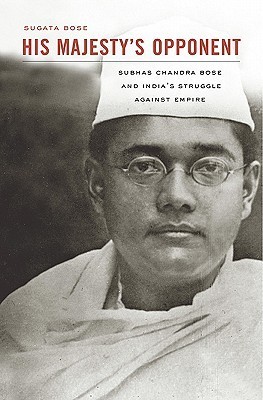What do you think?
Rate this book


448 pages, Hardcover
First published April 29, 2011
He had placed his personal life on hold until he gained Freedom for India, however when he hired an Austrian-born Emilie Schenkl as his secretary in Austria things changed and he fell in love with her. In 1937 in Bad Gastein he privately married Emilie and Anita his daughter was born in Vienna 1942. Subhas Chandra Bose passed away in Taipei, Taiwan (alleged) in a plane crash on August 18th 1945 aged 58 and his ashes are still interred at the Renkoji Temple in Tokyo, Japan.
To quote part of broadcast Subhas Chandra Bose gave from Singapore to Indians at home:
Sisters and Brothers,
A glorious chapter in the history of India’s Struggle for Freedom has just come to a close and, in that chapter, the sons and daughters of India in East Asia will have an undying place. You set a shining example of patriotism and self- sacrifice by pouring out men, money and materials into the struggle for India’s independence. I shall never forget the spontaneity and enthusiasm with which you responded to my call for “Total Mobilization.” You sent an unending stream of your sons and daughters to the camps to be trained as soldiers of the Azad Hind Fauj and of the Rani of Jhansi Regiment. Money and materials you poured lavishly into the war chest of the Provisional Government of Azad Hind. In short, you did your duty as true sons and daughters of India. I regret more than you do that your sufferings and sacrifices have not borne immediate fruit. But they have not gone in vain, because they have ensured the emancipation of our motherland and will serve as an undying inspiration to Indians all over the world. Posterity will bless your name, and will talk with pride about your offerings at the altar of India’s Freedom and about your positive achievement as well.
Mahatma Gandhi summed up Netaji’s achievements:
“He had sacrificed a brilliant career for the sake of the country’s service. He suffered various imprisonments, twice became President of the Congress, and at last by great strategy gave the slip to the guard put over him by the Government of Bengal and by sheer courage and resourcefulness reached Kabul, passed through European countries, and finally found himself in Japan, collected from scattered material an army of brilliant young men drawn from all communities and from all parts of India and dared to give battle to a mighty Government. A lesser man would have succumbed under the trials that he went through; but he in his life verified the saying of Tulsidas that “all becomes right for the brave.”
I was disappointed to read that his ashes were never brought back to India to create a monument in honor of his hard and honest work to Free India. His slogan “Chalo Delhi” he never made it to Delhi. He is “The Forgotten Hero.”
Indian paid a very heavy price with blood for Freedom, however in the end it was worth the fight. I did not know much about Subhas Chandra Bose and after reading his Biography I feel he was one of the most unique individual in the history of India. I would recommend this book to everyone with personal assurance that it is worth the time and effort to read about this great man.